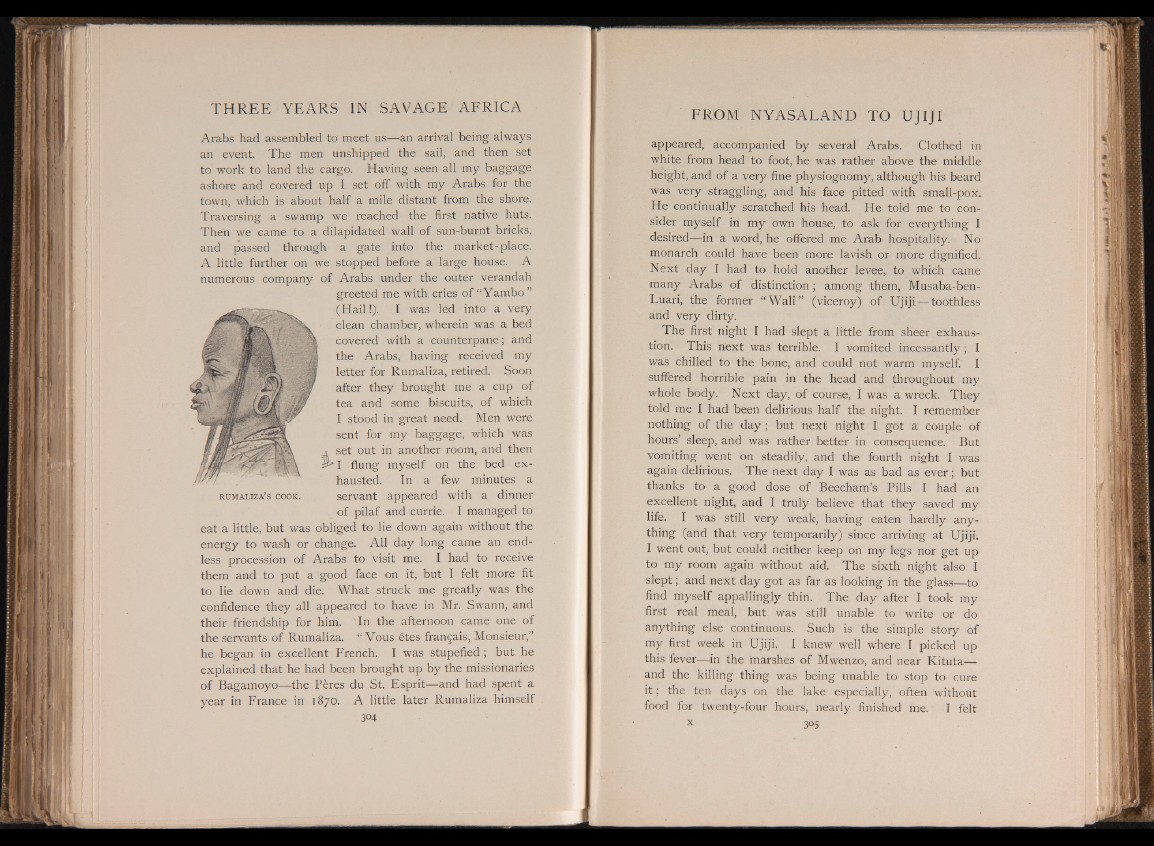
Arabs had assembled to meet us—an arrival being always
an event. The men unshipped the sail, and then set
to work to land the cargo. Having seen all my baggage
ashore and covered up I set off with my Arabs for the
town, which is about half a mile distant from the shore.
Traversing a swamp we reached the first native huts.
Then we came to a dilapidated wall of sun-burnt bricks,
and passed through a gate into the market-place.
A little further on we stopped before a large house. A
numerous company of Arabs under the outer verandah
greeted me with cries of “Yambo ”
(Hail !). I was led into a very
clean chamber, wherein was a bed
covered with a counterpane ; and
the Arabs, having received my
letter for Rumaliza, retired. Soon
after they brought me a cup of
tea and some biscuits, of which
I stood in great need. Men were
sent for my baggage, which was
j set out in another room, and then
I flung myself on the bed exhausted.
In a few minutes a
servant appeared with a dinner
of pilaf and currie. I managed to
eat a little, but was obliged to lie down again without the
energy to wash or change. All day long came an endless
procession of Arabs to visit me. I had to receive
them and to put a good face on it, but I felt more fit
to lie down and die. What struck me greatly was the
confidence they all appeared to have in Mr. Swann, and
their friendship for him. In the afternoon came one of
the servants of Rumaliza. “ Vous êtes français, Monsieur,”
he began in excellent French. I was stupefied ; but he
explained that he had been brought up by the missionaries
of Bagamoyop-the Pères du St. Esprit—and had spent a
year in France in 1870. A little later Rumaliza himself
3°4
r u m a l i z a ’ s c o o k .
appeared, accompanied by several Arabs. Clothed in
white from head to foot, he was rather above the middle
height, and of a very fine physiognomy, although his beard
was very straggling, and his face pitted with small-pox.
He continually scratched his head. He told me to consider
myself in my own house, to ask for everything I
desired—in a word, he offered me Arab hospitality. No
monarch could have been more lavish or more dignified.
Next day I had to hold another levee, to which came
many Arabs of distinction; among them, Musaba-ben-
Luari, the former “ Wali” (viceroy) of Ujiji—toothless
and very dirty.
The first night I had slept a little from sheer exhaustion.
This next was terrible. I vomited incessantly; I
was chilled to the bone, and could not warm myself. I
suffered horrible pain in the head and throughout my
whole body. Next day, of course, I was a wreck. They
told me I had been delirious half the night. I remember
nothing of the d a y ; but next night I got a couple of
hours’ sleep, and was rather better in consequence. But
vomiting went on steadily, and the fourth night I was
again delirious. The next day I was as bad as ever; but
thanks to a good dose of Beecham’s Pills I had an
excellent night, and I truly believe that they saved my
life. I was still very weak, having eaten hardly anything
(and that very temporarily) since arriving at Ujiji.
I went out, but could neither keep on my legs nor get up
to my room again without aid. The sixth night also I
slept; and next day got as far as looking in the glass—to
find myself appallingly thin. The day after I took my
first real meal, but was still unable to write or do
anything else continuous. Such is the simple story of
my first week in Ujiji. I knew well where I picked up
this fever-fl-in the marshes of Mwenzo, and near Kituta—
and the killing thing was being unable to stop to cure
i t ; the ten days on the lake especially, often without
food for twenty-four hours, nearly finished me. I felt
x 3°S